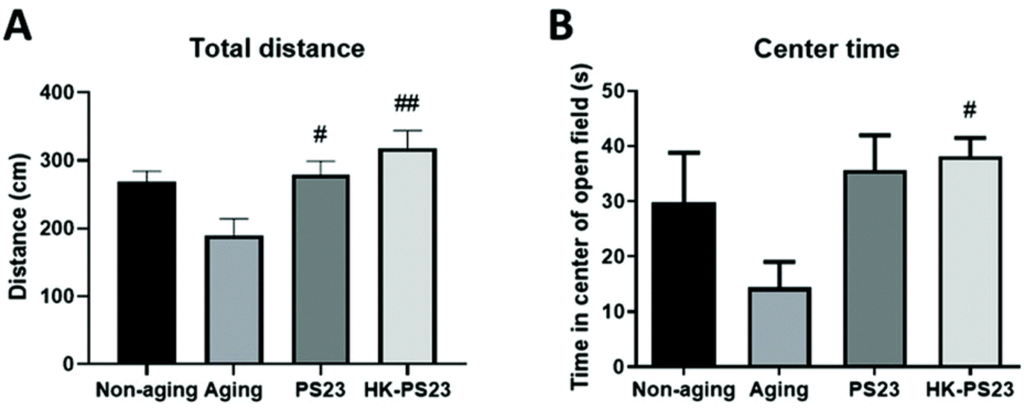Probiotic Alleviates Brain Aging in New Study
Scientists reduce cognitive decline and anxiety-like behavior with the probiotic Lactobacillus parcasei PS23 in age-accelerated mice.
Highlights:
- Feeding age-accelerated mice Lactobacillus parcasei PS23 (PS23) improves their learning and memory.
- PS23 reduces anxiety-like behavior and increases the neurotransmitter serotonin.
- Genes involved in neuroplasticity, anti-inflammatory, and antioxidant function are increased by PS23.
By the year 2030, 1 in every 6 individuals will be over the age of 60, prompting the United Nations to declare 2021-2030 the Decade of Healthy Aging.
“As both the proportion of older people and the length of life increase worldwide, the key questions are whether older people can enjoy a longer period of good health, a sustained sense of well-being, and extended periods of social engagement and productivity,” state the authors of a new study published in Food & Function.
In the study, Cheng and colleagues report that PS23 improves cognitive deficits in a mouse model for aging. They show that PS23 restores age-related learning and memory deficits and reduces anxiety-like behavior. They also show that PS23 elevates brain serotonin levels while increasing the activation of neuroplasticity, anti-inflammatory, and antioxidant genes.
The authors state that “measures [such as PS23] to reduce ageing related cognitive decline and mood disorder will contribute tremendously to ensuring improved health and wellbeing in the elderly population.”
Probiotic Improves Memory and Mood
Since waiting for mice to age naturally is time-consuming and expensive, researchers commonly induce aging in younger mice using a sugar called D-galactose (D-gal). Age-accelerated D-gal mice exhibit features of aging similar to humans, including memory deficits and neurodegeneration. Cheng and colleagues compared untreated D-gal mice to D-gal mice fed live PS23 or heat-killed (HK)-PS23 — which may have commercial advantages such as longer shelf life — for nine weeks.
The Morris water maze test is commonly used to measure learning and memory. The test involves training mice for five days to find a transparent underwater platform to escape drowning. On the sixth day, the platform is removed, and the time spent in the former location of the platform is measured as an indicator of learning and memory. The results showed that PS23 restored the time D-gal mice spent in the correct location.

To examine anxiety-like behavior, the researchers placed mice in an open field and measured the distance they traveled and the amount of time they spent in the center. Moving less and staying near the edges is considered anxiety-like behavior. While the D-gal mice tended to move less and stay away from center stage more often, treatment with PS23 essentially stopped this behavior. These findings suggest that PS23 may enhance mood and increase activity.
Serotonin (5-HT) is a neurotransmitter associated with mood. Antidepressant and anti-anxiety medications called selective serotonin reuptake inhibitors (SSRIs) are often prescribed to elevate serotonin levels and enhance mood. Cheng and colleagues found that both PS23 and HK-PS23 elevated serotonin levels in the hippocampus — the brain region that consolidates memories — of D-gal mice. Elevated serotonin may explain the improved memory and reduced anxiety-like behavior in PS23-treated D-gal mice.

There are several processes that putatively underlie aging, including reduced antioxidant activity and inflammation. In the aging brain, neuroplasticity — the formation of new neuronal connections — declines. In the hippocampus, Cheng and colleagues found that PS23 but not HK-PS23 mitigates age-related reductions in antioxidant activity. Additionally, both PS23 and HK-PS23 promoted gene activity for reduced inflammation and increased neuroplasticity. These findings suggest that PS23 targets the underlying processes that give rise to aging.
Can Probiotics Mitigate Brain Aging in Humans?
The findings of Cheng and colleagues suggest that PS23 can improve memory and reduce anxiety-like behavior in age-accelerated mice by increasing serotonin, antioxidant activity, and neuroplasticity while reducing inflammation.
“PS23 and HK-PS23 show great potential as dietary supplements for improving cognitive and motor functions in the elderly,” state the authors.
PS23 has been termed a psychobiotic because of its effects on mental health. It has been shown to improve anxiety in highly stressed clinical nurses, suggesting that it could affect the mental health of older adults, particularly those who are highly stressed. While two previous studies linked to Bened Biomedical have shown that PS23 may improve cognition in mouse models for aging, more clinical studies will be needed to determine the effects of PS23 and other probiotics on the aging brain.
Model: Male C57BL/6J mice injected with D-galactose to induce aging
Dosage (oral): PS23 10^9 CFU/day, or HK-PS23 10^9 cells/day

